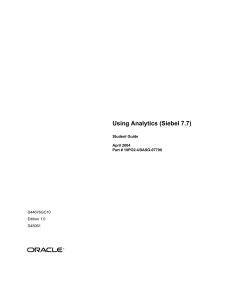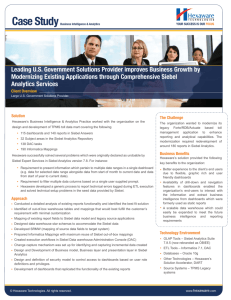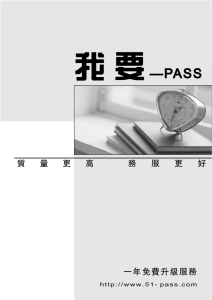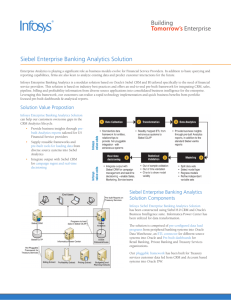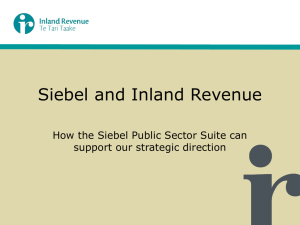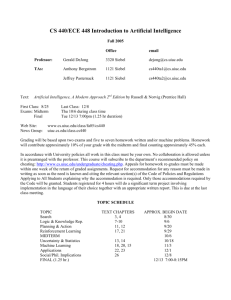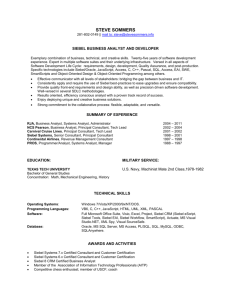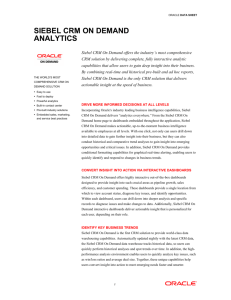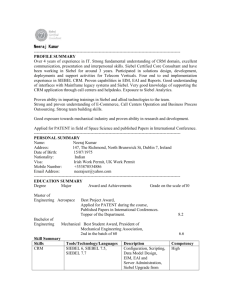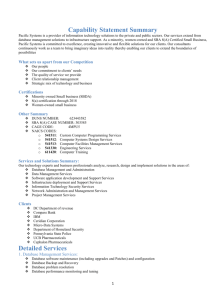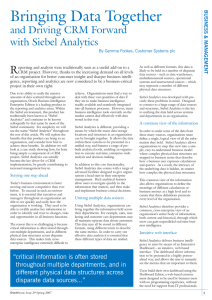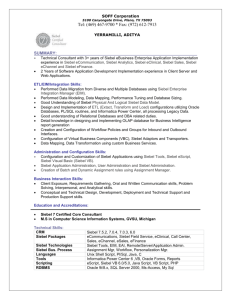List of Training Services - The Patriot Entrepreneur
advertisement
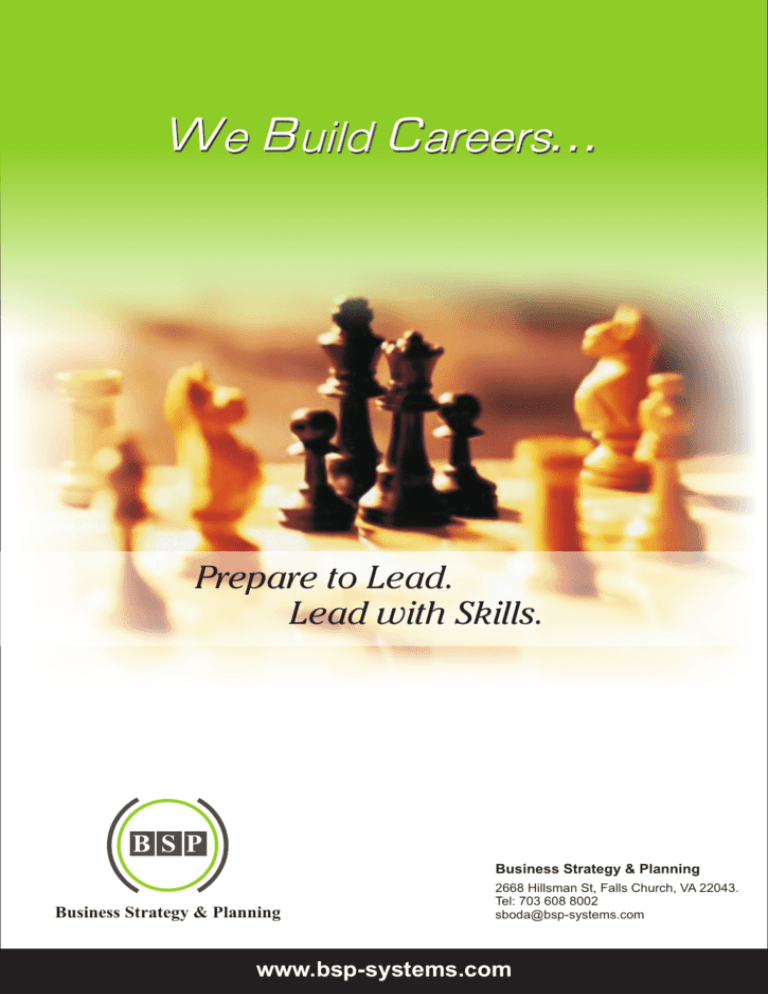
We Build Careers... Prepare to Lead. Lead with Skills. BSP Business Strategy & Planning Business Strategy & Planning 2668 Hillsman St, Falls Church, VA 22043. Tel: 703 608 8002 sboda@bsp-systems.com www.bsp-systems.com Training Roadmap Enterprise Data Warehousing OLTP vs. OLAP Data warehousing Fundamentals Data Modeling Oracle SQL * PLUS & PL/SQL Informatica Power Center Architecture Data Source and Data Targets Data Transformation and Mapping Workflow and Performance Tuning Siebel Analytics Architecture Configure Siebel Application Load Data Into Siebel Database Data Retrieval through Siebel Query Siebel Web architecture Siebel Reports Case Study and Sample Project Siebel Migrate Object between Environment Course Objectives: Understand the difference between OLTP vs. OLAP Understand RDBMA , Data warehousing Fundamentals, and Data warehousing Architecture Perform Conceptual , Logical and Physical Data Modeling Develop PL/SQL Programs and data conversion programs Understand the fundamentals of Informatica PowerCenter and its Architecture Acquire the solid foundation to make you successful Informatica PowerCenter consultant Learn Advanced Mapping Techniques , Performance tuning and partitioning feature Enable students to gain a foundational understanding of business intelligence concepts, Siebel Business Analytics architecture and user interfaces Enable students to gain a foundational understanding of the pre-built components of Siebel Business Analytics Applications Ability to navigate within Siebel applications Understanding of the underlying architecture of Siebel applications Domain experience in business intelligence, data warehouse design, and database design Describe the advantages of using a standardized implementation methodology Identify the recommended approach for implementing Siebel applications Identify how each client accesses Siebel Servers and data Install the Siebel Gateway Name Server, Enterprise Server, Siebel Server, and Database Server Test server-to-database connectivity Describe the layers in the Siebel security model Use Siebel Tools to examine parent and child object definitions List the critical elements of the Siebel configuration strategy Use configuration file parameters to enhance performance Create and test assignment rules Use Application Deployment Manager to migrate run-time configuration data from one environment to another Describe Siebel Remote components and their function Describe how Siebel Remote identifies and resolves database conflicts Describe how to set up Mobile Web Clients Explain how Siebel and Actuate applications interact to produce reports List common types of Siebel reports Explain the roles of slots, components, and libraries in Actuate report designs List the files involved in generating a report Identify the components that specify the Siebel data available in a report Group data in a list report based on a key field Include summary functions in a report Describe how to create master-detail reports with multiple hierarchies Explain how components are classes having properties and methods Override methods to customize component behavior Add parameters to Siebel reports Describe the reports-generation architecture, including the Siebel and Actuate components involved Manage report scheduling and notification Enterprise Data Warehousing Powered by Informatica & Siebel Analytics Session Session Topics Session Details Data warehousing Fundamentals 1 RDBMS Fundamentals RDBMS Fundamentals 2 OLTP vs. OLAP Difference between OLTP and OLAP application Difference between an Enterprise Application and custom applications LAB 3 Data Warehousing Fundamentals Cubes ODS Virtual InfoProvider Dimensions Facts KPI (Key performance indicator) Master Data Transaction Data Hierarchy Text Attributes LAB 4 Data Warehousing Architecture Source Systems ETL Services Metadata Services Access Services Storage Services Presentation Services Archiving Services Scheduling Services LAB 5 Data Modeling ERD (Entity Relationship Model) Subject Area Model Dimension Model Multi Dimension Model Classis Star Schema Extended Star Schema Snowflake Schema Modifying Existing Model Performance Fine Tuning LAB Oracle PL/SQL Fundamentals 6 SQL * PLUS DDL Statements DML Statements TCS Statements Oracle Build in Functions Oracle 10G New Features Table Joins Sub Queries SQL Optimization LAB Session Session Topics Session Details Oracle PL/SQL Fundamentals 7 PL/SQL PL/SQL Structure Declare , Open , Fetch , and Close Cursors Dynamic SQLs User Defined Types (Tables and Arrays ) Exception Handling Packages Functions Procedures Triggers Views Tables Index Sequences Synonyms Informatica 8 Informatica PowerCenter Architecture Power Center Components Designer Repository Manager Workflow Manager Workflow Monitor Informatica Concepts and Overview Source Qualifier Target Qualifier Transformation Mappings Mapplets 9 Source Working with relational Sources Working with Flat Files 10 Target Working with relational Targets Working with Flat Files 11 Transformation Expression Lookup Sequence Generator Filter Joiner and Sorter Procedural Router Aggregator Active and Passive Transformations Update Strategy Data Concatenation Debugging Mappings 12 Mappings & Mapplets Mapping Variables & Parameters Creating Cubes & Dimensions Working with Mapping Wizards 13 Workflow Manger Server Architecture Workflows, Worklets & Sessions Tasks, Assignments, Events, Command etc, 14 Performance Tuning Informatica Tuning Oracle Tuning Session Session Topics Session Details Siebel Analytics 15 Siebel Analytics Installation Siebel Analytics Installation 16 Siebel Analytics Architecture Siebel Analytics Web (SAW) Siebel Analytics Server (SAS) Pop Chart Server Siebel Analytics Scheduler Siebel Analytics Admin Tool 17 Information Flow between client and server Importing Physical Tables Creation of Physical Joins Configuring Connection Pools 18 Physical and Logical Layer Creation of Business Model Creation of Logical Facts Creation of Dimensions Creation of Dimension Hierarchies/Levels Creation of Measures Aggregation Navigation 19 Presentation Layer Presentation Layer Creation of Presentation Catalog Creation of Presentation tables Creation of Presentation Columns 20 Siebel Analytics Admin Tool Groups Users Repository Variables Session Variables Initialization Blocks 21 Siebel Analytics Components in User Interface (UI) Layer Folders Dashboards Pages Columns Sections Reports Filters Global Filters GoNav , and Different types of Views 22 Siebel Analytics Cache Management Enabling Cache Automated Cache Purging using Event Polling 23 Siebel Analytics Repository Development Siebel Analytics Repository Development 24 Development using Siebel Answers Development using Siebel Answers 25 Siebel Analytics Time SeriesWizard Siebel Analytics Time Series Wizard Session Session Topics Session Details Siebel Analytics 26 Security Implementation Object Alias Year Ago, Quarter Ago, Month Ago Authentication LDAP Database Repository External Table Authorization Filters, Data Security – GROUP UI Security – WEBGROUPS Note: The delivery of this curriculum is based on a real-time end-to-end Data Warehousing Case Study, and this case study based delivery model will increase participant’s confidence level to handle any complex project situations in their job functions. Disclaimer: CloneSkills is an independent training and Siebel/Informatica solutions company, not affiliated to Siebel or Informatica. At CloneSkills we exclusively promote Siebel/Informatica Solutions and do not compete with Oracle or Informatica. BSP Business Strategy & Planning 2668 Hillsman St, Falls Church, VA 22043. Tel: 703 608 8002 sboda@bsp-systems.com Business Strategy & Planning www.bsp-systems.com
